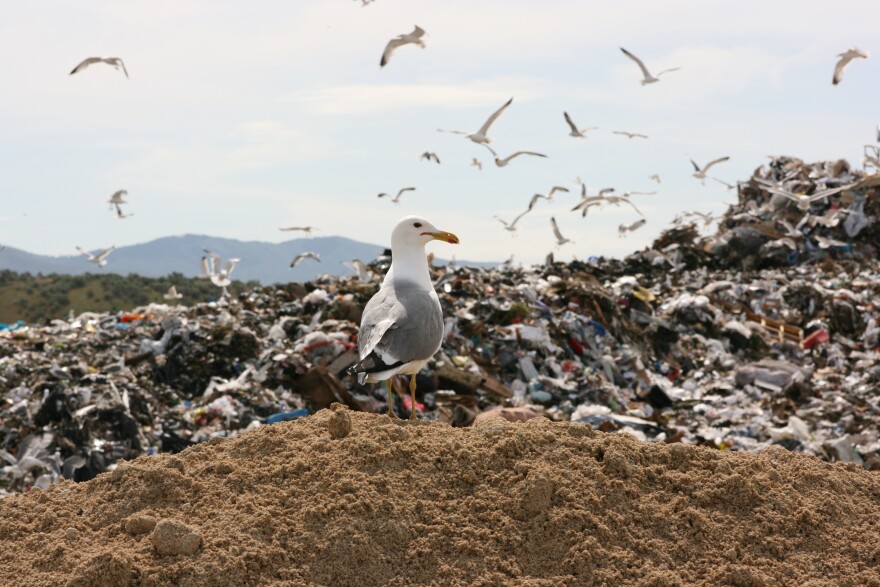In 2014, an analysis in Ada County determined that nearly half of the trash being thrown out by residential households was organic waste, such as food scraps, yard debris, and compostable paper. Now, in an effort to reduce the amount of trash going to the landfill, the City of Boise has announced plans for a public composting program.
Boise city staff presented the first details of the composting program proposal at last Tuesday’s City Council meeting. City spokesman Mike Journee says it’s been dubbed ‘Curb It 2’ and will be an extension of Curb It, the city’s recycling system.
“It would be very similar to the recycling program, it would be a curbside bin that would be picked up on a regular basis, on a weekly basis at people’s homes for an additional fee,” says Journee.
That monthly fee of $3.40 will be added to the $14 that Boise residents already pay for trash and recycling. The increase would start October 1. Compost pick up would begin in a year.
A Similar Program: The Numbers
Denver launched its own public composting program in 2008. Since then it’s faced a dilemma: lots of landfill space and very low tipping fees. Tipping fees, also called gate fees, are rates paid upon entry to a landfill. Charlotte Pitt, who oversees solid waste management in Denver, says large landfills like Denver’s make it cheaper to just throw things away rather than recycle or compost through more expensive programs.
“We’ve had to really sort of talk about sustainability and, you know, how this is better for the environment because on some levels it’s really hard to compete economically,” Pitt says.
Denver’s program serves five routes and collects about 5,000 tons of compost annually. And eight years in, Pitt concedes economics are still an issue. Denver does not charge a fee for trash and recycling, but does for compost. Pitt believes for the program to become as popular as Denver’s trash and recycling programs, the composting option will also have to be free.
Is Organic Waste In Ada County's Landfill Really A Bad Thing?
The Ada County landfill is a massive and intricate operation mostly hidden in the foothills. It’s overseen by a man named Ted Hutchinson. Hutchinson says the landfill is always looking for solutions that make sense economically and improve the landfill’s environmental conditions. But when asked if a city-wide composting program would be beneficial to the landfill, Hutchinson’s response is mixed.

“Is it a good thing to do? Absolutely,” Hutchinson says. “Composting is a marvelous way to keep things out of the waste. It returns things, nutrients, back to the soil. It has very many huge benefits to, particularly, gardens and farms.”
But Hutchinson says organic waste in Ada County’s landfill is not necessarily a bad thing. That’s because the site is equipped with a system that turns gases from decomposing yard and food waste into electricity.
Does Composting Change Our Relationship With Waste?
Dr. Joshua Reno of Binghamton University in New York worked for nine months at a landfill outside of Detroit and then wrote a book about what he sees as America’s problematic relationship with waste. Reno believes that because we are so separated from how our waste is disposed of, we will always be creating even more waste. And while he doesn’t discourage waste diversion tactics, such as public composting programs, he says they amount to only putting a Band-Aid on America’s waste problem.
“If it’s only something to conceal, to hide, to send somewhere else, then we’re deriving most of the meaning from its absence rather than from being connected to it,” Reno says.
So how can Boise ensure its composting program is not only successful, but truly minimizes waste production? According to Reno, something as simple as an accompanying gardening program could boost the composting program’s success, and improve Boise’s relationship to waste in general.

“That would add another dimension to it where it not only could grow something of economic value but could also have cultural meaning for people,” says Reno. “That they see that waste, all waste really, is part of a process of reuse that’s going on that really is going to happen one way or another.”
Boise's Composting Goals
Some details of Boise’s composting program remain up in the air, such as whether citizens who already compost could be exempt from paying more, or if meat and dairy products will be allowed in the collection. As officials weigh these issues, spokesman Mike Journee says one of the city’s goals with this public composting program is not only to make a difference, but to be an example.
“We approach something like this as an opportunity to really try something new, to step out ahead of the pack, and see if we can be at the forefront of something that could then be a model for other cities around the region, the country, or even the world,” says Journee.
City staff will report back to the council on those aspects of the program that remain undecided. Journee says the council will likely vote on funding for the composting proposal as part of the larger budget process this summer.
For more local news, follow the KBSX newsroom on Twitter @KBSX915
Copyright 2016 Boise State Public Radio



